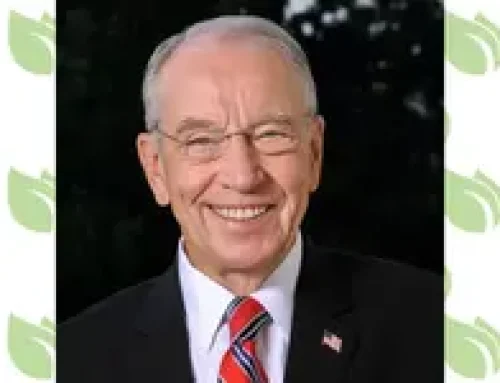Source: Farmers for Free Trade news release
The Trump Administration’s across-the-board tariffs are fueling economic uncertainty, raising prices for consumers, and forcing small businesses to make difficult choices about their future. While July 9 marked the end of the 90-day pause on the tariffs and when new agreements with major trading partners were promised, the Trump Administration continues to move the goalposts and has sent new letters to countries with new tariff amounts. Business owners across industries–from farming to manufacturing to retail–are bracing for even more disruption and uncertainty.
Yesterday, small business owners from across the country shared firsthand how the tariffs have affected their operations, communities, and plans for growth. Uncertainty and higher costs are creating supply instability, undermining investment, and driving pessimism about long-term economic prospects. Rather than another delay or exchange of letters, participants discussed how they want predictable trade policy and lower input costs.
Here is what they said:
Aaron Lehman, Iowa Farmer and President of the Iowa Farmers Union (Polk County, IA):
“Our farm and thousands and thousands of farms throughout Iowa and across the country are being impacted by chaotic tariffs and trade policies. So what does this mean to the average farmer? It means that because of these increased costs and lower market prices for what we grow, it means we put off buying machinery and… making other farm improvements. We were less likely to support our local suppliers and manufacturers.”
Nick Colombo, Co-Founder, Switchgrass Spirits (St. Louis, MO):
“Six months ago we were talking with distributors in France and South Korea to sell our American product made out of American grain, American barrels to South Korea and bring money into our community. We’re no longer doing that because of retaliatory tariffs. It is too risky for us to make that investment, and we are no longer trying to sell our goods outside of this country. That’s a huge miss, not only for us, but also for the people we buy grain from and the people we buy barrels from.”
Angela Hawkins, Owner & Founder, Bamblu (Atlanta, GA):
“Now, I could have product in production over the next couple of months and when it arrives at the port, I don’t know what I’m going to have to pay for that. Therefore I don’t know what my return on investment is going to be. So, it’s just a very difficult time for small businesses to plan and to accurately execute. Hiring is reliant on what these tariffs do… All the things that require us to be a sound business are up in the air, because we don’t know what tariff decisions are going to be on the docket next month.”
Rachel Lutz, Owner, Peacock Room (Detroit, MI):
“I’m trying to buy inventory for next January, next February, and I can’t even figure out what the pricing will be, and my vendors don’t know either. A lot of them are wondering, like how many samples do we cut? Do we cut the normal 100 samples? Do we cut 50? Do we give fewer selections to us consumers? I’ve had a key vendor that does all of my most of my winter accessories like hats and gloves. They shut down their US arm completely.”
David Bulcock, General Manager and Managing Partner, Rochester Brewing and Roasting Company (Kansas City, MO):
“When the tariffs were announced, we were days away from inking a deal with a local developer to be what would have been considered an anchor tenant in a large development. We had in line basically ready to go larger production facility. And we were going to be opening a second retail location along with that… Everything came to a screeching halt to be completely honest. People got nervous. Not only investors, but banks got nervous… we had to shelf it… I think it just comes down to that uncertainty. We all want to be able to plan and grow.”
Steve Jenkins, CEO, Jenkins Enterprises (North Little Rock, AR):
“The theory behind tariffs is to drive manufacturing back to America, so that we can have jobs for Americans… What about the American workers that are at my place? I have 70 people right now that rely on this product for their jobs. The manufacturing process is actually probably one of the smallest parts of our business. I mean American workers. We design it. We prototype it. We send it overseas. We see a sample. We place orders. We create purchase orders when it comes in. It comes in on American trucks, trains, dock workers handle it. It comes to our facility, we unload it, we stock it, we process it, we print it, we pack it, we ship it. We sell it, we collect for it all of that is affected. All of those are American workers and American jobs that are currently in effect, because we can buy this product from overseas and sell it at a price that is available.”
Robert Hemesath, Iowa Farmer and Board President of Farmers for Free Trade (Decorah, IA):
“And usually when tariffs like these happen, agriculture is one of the first ones that gets hit, because we’re a big export market, and it’s easy for other countries to put tariffs on our products. And that has happened throughout this whole process. It’s created a tremendous amount of uncertainty because we watch our market share around the world dissipate or decline. And we don’t know if this lasts for an extended period of time… Once you lose that market, it’s difficult to get it back. So there’s a huge amount of urgency that needs to happen in this whole process, because the longer this goes on, the harder it’s going to be to get those markets back.”
About Tariffs Cost US
Tariffs Cost US is a new campaign dedicated to providing the public with reliable, comprehensive information about global trade and tariffs, and their impact on both businesses and consumers. More information is available at https://tariffscostus.com/.
About Farmers for Free Trade
Farmers for Free Trade is a campaign that gives farmers and ranchers a voice in the trade debate. The organization advocates for trade policies that expand market access for American agriculture and promote economic growth. More information is available at www.farmersforfreetrade.com.



